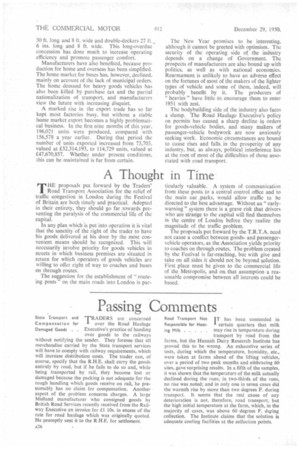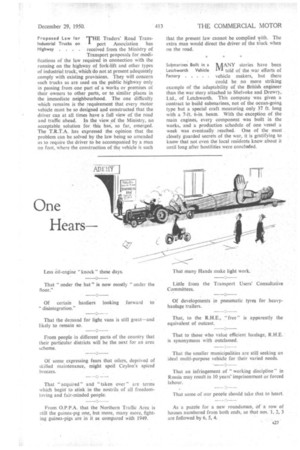Passing Comments
Page 28

Page 29

If you've noticed an error in this article please click here to report it so we can fix it.
State Transport and TRADERS arc concerned Compensation for 1 over the Road Haulage Damaged Goods . • Executive's practice of handing over goods to the railways without notifying the sender. They foresee that all merchandise carried by the State transport services will have to comply with railway requirements, which will increase distribution costs. The trader can, of course, specify that the R.H.E. shall carry the goods entirely by road, but if he fails to do so and, while being transported by rail, they become lost or damaged because the packing is not adequate for the rough handling which goods receive on rail, he presumably has no claim for compensation. Another aspect of the problem concerns charges. A large Midland manufacturer who consigned goods by British Road Services recently received from the Railway Executive an invoice for £1 10s. in excess of the rate for road haulage which was originally quoted. Be promptly sent it to the R.H.E. for settlement.
A26
Road Transport Not IT has been contended in Responsible for HeatI certain quarters that milk ing Milk may rise in temperature during transport by road from the farms, but the Hannah Dairy Research Institute has proved this to be wrong. An exhaustive series of tests, during which the temperature, humidity, etc., were taken at farms ahead of the lifting vehicles. over a period of two peak months and einbracing 60 sites, gave surprising results. In a fifth of the samples, it was shown that the temperature of the milk actually declined during the runs; in two-thirds of the runs, no rise was noted; and in only one in seven cases did the warmth rise by more than two degrees F. during transport. It seems that the real cause of any deterioration is not, therefore, road transport, but the high initial temperature at the farm, which, in the majority of cases, was above 60 degrees F. dwing collection. The Institute claims that the solution is adequate cooling facilities at the collection points. THE Traders' Road Transport Association has received from the Ministry of Transport proposals for modifications of the law required in connection with the running on the highway of fork-lift and other types of industrial truck, which do not at present adequately comply with existing provisions. They will concern such trucks as are used on the public highway only in passing from one part of a works or premises of their owners to other parts, or to similar places in the immediate neighbourhood. The one difficulty which remains is the requirement that every motor vehicle must be so designed and constructed that the driver can at all times have a full view of the road and traffic ahead. In the view of the Ministry, no acceptable solution for this has, so far, emerged. The T.R.T.A. has expressed the opinion that the problem can be solved by the law being so amended as to require the driver to be accompanied by a man on foot, where the construction of the vehicle is such
Proposed Law for Industrial Trucks on Highway . . . .
that the present law cannot be complied yith. The extra man would direct the driver of the truck when on the road.
Submarines Built in a MANY stories have been Letchworth Vehicle " told of the war efforts of Factory vehicle makers, but there
could be no more striking example of the adaptability of the British engineer than the war story attached to Shelvoke and Drewry, Ltd., of Letchworth. This company was given a contract to build submarines, not of the ocean-going type but a special craft measuring only 37 ft. long with a 7-ft. 6-in. beam. With the exception of the main engines, every component was built in the works, and a production schedule of one vessel a week was eventually reached. One of the most closely guarded secrets of the war, it is gratifying to know that not even the local residents knew about it until long after hostilities were concluded.




















































































